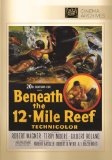| Reviews & Columns |
|
Reviews DVD TV on DVD Blu-ray 4K UHD International DVDs In Theaters Reviews by Studio Video Games Features Collector Series DVDs Easter Egg Database Interviews DVD Talk Radio Feature Articles Columns Anime Talk DVD Savant Horror DVDs The M.O.D. Squad Art House HD Talk Silent DVD
|
DVD Talk Forum |
|
|
| Resources |
|
DVD Price Search Customer Service #'s RCE Info Links |
|
Columns
|
|
|
Beneath The 12-mile Reef (Fox Cinema Archives)
"You See It Without Special Glasses!"
Broad, bogus widescreen transformation of Romeo and Juliet into rival Florida sponge divers, rescued only by composer Bernard Herrmann's remarkable score. 20th Century-Fox's Cinema Archives line of hard-to-find cult and library titles seems to have wrestled back the copyright of one of Fox's (sorta) historically important titles: Beneath the 12-Mile Reef, the 1953 "epic" shot in CinemaScope (either the second or third feature in that milestone widescreen process). Lensed on location in the Keys and on the Florida Gulf coast, and starring a, um...rather colorful cast of hambones including Robert Wagner, Terry Moore, Gilbert Roland, J. Carrol Naish, Richard Boone, and Peter Graves, Beneath the 12-Mile Reef is frequently ridiculous moviemaking, from Robert D. Webb's flat direction, the ersatz "socially conscious" script from ace scripter A. I. Bezzerides, and the reliably bad thesping from everyone. However...Beneath the 12-Mile Reef does sport a big, lush, notable score by master Bernard Herrmann, so crank up your amplifier and go do the dishes until the silly rubber octopus attack comes along. No extras for this pretty good anamorphically enhanced (good on you, Cinema Archives) widescreen release.
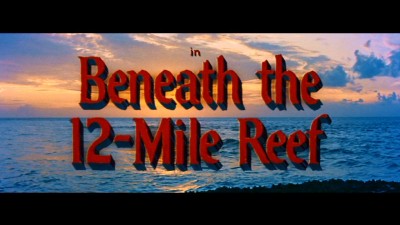
The sponges, you see...they are a'thinning out, no? And preening, strutting Greek-American sponge diver Mike Petrakis (Gilbert Roland) is in hoch up to his conches with Greek-American loan shark Demetrios Sofotes (Jacques Aubuchon), who wants his 12 thousand clams or else Mike's boat, The Aegli. So, if overpoweringly masculine Mike wants to keep wife Mama Petrakis (Angela Clarke), daughter (with the tough-to-pronounce) Greek name "Penny" (Gloria Gordon), and especially eager-beaver son Tony (Robert Wagner) in plenty of chowder, he's got to go back out to deep water to the beautiful, dangerous 12-Mile Reef, where the bigger, better sponges practically litter the ocean floor...and where his older son Peter had previously met his doom in the treacherous waters. However, when Tony wins a diving contest and is blessed by the local priest, papa Mike believes his luck has changed, so instead of the Reef, Mike opts for easy pickings in the 'glades--territory he knows is traditionally "off-limits" to Greek spongers, since the "Conches" (the script's fuzzy way of saying they're probably/maybe/sorta WASPyish-Americans who apparently don't like anybody who doesn't look like them) have always fished there. Sure enough, the minute the Aegli crew gets a boatload of sponges, creepy "pirate" Arnold Dix (Peter Graves) threatens to chop papa Mike's air hose unless the sponges are handed over pronto to head White Oppressor, Thomas Rhys (Richard Boone). Later, in Key West, Mike goes looking for payback, but backs down when confronted with the Conches' superior numbers. Tony, however, lays on his Hollywood-approved ethnically-correct boisterous Greek charm, and slays Gwyneth Rhys (Terry Moore), Thomas' daughter and possessive, deluded Dix's would-be girlfriend. You can pretty much write the rest of this yourself, including escalating violence from Dix (he really is a Dix), the untimely death of a preening, strutting, overpoweringly masculine central character, the star-crossed lovers' idyllic runaway interlude...and a giant octopus helping a boy become a man (no, not that way...).

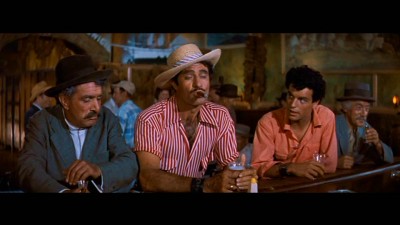
Even I fell into the trap of mentioning one of Beneath the 12-Mile Reef's two main claims to fame: its second or third spot in the initial roster of CinemaScope productions (How to Marry a Millionaire actually finished shooting before the first-started The Robe, but was held up to allow the Biblical epic to bow ahead...with Beneath the 12-Mile Reef's filming coming in somewhere inbetween). Of course that bit of anamorphic trivia for this soggy deep sea drama means nothing to most viewers today, and to be honest, I'm not sure it meant quite as much to ticket buyers back then, as historians would have you think now. There's no doubt that the name "CinemaScope" meant shekels in the tills back in '53. It's important to remember, though, that just because Beneath the 12-Mile Reef was the third CinemaScope picture, it wasn't only the third movie in "wide-screen" that the public saw that year. Other studios--Fox, too, eventually--were suddenly (and cheaply) hard and soft-matting their releases left and right when they heard about anamorphic CinemaScope; when Oscar-nominated Beneath the 12-Mile Reef lost the Best Cinematography that year, it lost it to Paramount's Shane, which had been cropped and released "wide" almost 9 months before Beneath the 12-Mile Reef--a grotesque irony since Shane's cropping was done against the horrified protestations of director George Stevens, who never intended his meticulously-composed 1.37:1 frames (the movie was actually shot in '51) to be mutilated that way. Rentals returned to Fox certainly proved that CinemaScope could help sell an otherwise hackneyed, cheapjack adventure like Beneath the 12-Mile Reef...but Reef's grosses were nowhere near as impressive as either The Robe or How to Marry a Millionaire.
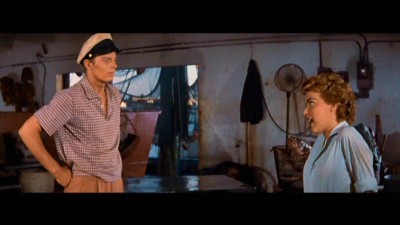
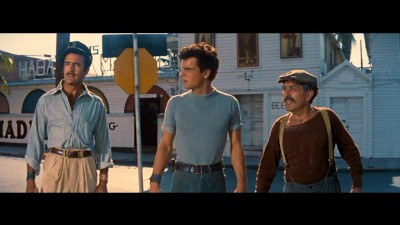
So discounting the chintzy allure of its minor CinemaScope pedigree, one is left with just the movie itself...and boy is it a whale of a minnow. If the anamorphic lens had been 86ed from the production, it's doubtful that Beneath the 12-Mile Reef would have qualified for much more than a spot on a Fox double bill, such is its cliched, overly-familiar storyline (no matter how "exotic" its pasted-on locale is) and its surprisingly inept execution (more about that later). Apparently, according to one or two new reviews I've read online, what's primarily interesting now about Beneath the 12-Mile Reef, is its sociology; specifically, the so-called clash of cultures between the Greeks and the "Conches" here, with the brave little Greeks battling the vicious, avaricious "Conches" for economic survival. Now, I don't want to read too much into Beneath the 12-Mile Reef, not only because clearly it's such a nothing little programmer, but also because the screenwriter himself, A. I. Bezzerides, made statements to the effect that latter-day "film historians" (yeech) had extrapolated intent and meanings into his movies that he hadn't planned or even thought of (see his thoughts on Aldrich's Kiss Me Deadly). Is that also the case here, in Beneath the 12-Mile Reef? Was he trying to say something "meaningful" about ethnicity in this tale of sponge fishers, or was he, as he claimed with Kiss Me Deadly, "just having fun?"
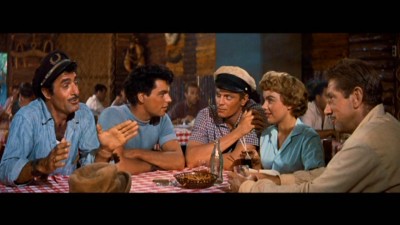
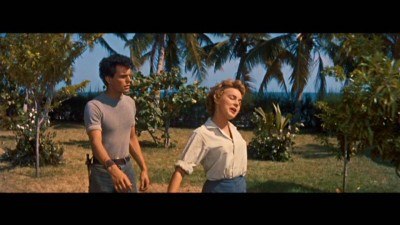
Now, I never expect Hollywood movies, then or now, to accurately convey the true details and specifics of the situations they present on the screen. I didn't know a thing about sponge fishing or diving when I watched Beneath the 12-Mile Reef, so I read up on it a little bit before I wrote this, and not surprisingly, Bezzerides (and/or whoever else came along and perhaps reworked his script?) got almost all of it wrong here. I'm not going to write a term paper on sponge fishing (my three loyal sponge diver readers just groaned), but it is important to see what Bezzerides changed when he wrote the screenplay. Granted, I'm no one-day expert on sponge fishing, but nothing I read indicated that the Greeks who fished for sponge off the coast of Florida were "oppressed" by WASPy-like competitors. On the contrary, everything I've read seems to indicate the Greeks owned sponge fishing there; that they were asked to come to Florida and turn a fledgling local economy into a world-wide one, and that they were responsible for bringing the advanced technology of helmeted/air hose diving to the States. And they made lots of money doing so. They were hardly "underdogs" in the real-life sponge fishing world...and yet they are here. Beneath the 12-Mile Reef even screws up the fundamental basics of that fishing. The movie implies that Mike is forced to go deeper as a last resort, because the sponge fields are all tapped out. As a result, the implication is, all would be right if the Greeks were allowed to "hook" the sponges in the 'glades, where the lazy "Conches" rule the roost. In actuality, the Greek sponge divers--a truly fearless, proud group who routinely performed long underwater dives that nobody would attempt today--willingly went out into deeper water where the bigger sponges were; "hook" sponging only netted smaller, inferior sponges, and had long-played out in Florida by the 1950s. Indeed, sponge fishing as a Florida industry was almost dead by the time Beneath the 12-Mile Reef came out, but not because cold, venal WASPy Whites were oppressing kindly, big-heart, laughing Greeks...but because the sponge fields suffered wide infection, and the cheaper, more easily mass-produced synthetic sponges were first being marketed. So if somehow you find yourself seriously reading ethnic and economic clashes into the sponge fishing world of Beneath the 12-Mile Reef of all things, you'd better know you're reading something that was made up whole-cloth from a Hollywood screenwriter.

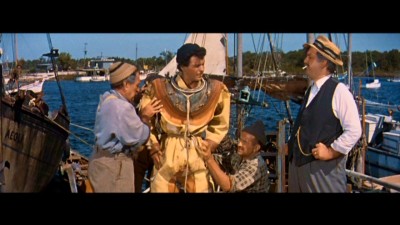
Despite his past works that dealt with such issues, I don't think for a moment that Bezzerides intended a bit of action-filled fluff like Beneath the 12-Mile Reef to be a serious screed, sly or broad, on American ethnic relations during tough economic times (someone out there reviewing movies does, though...). However, it's clear, in his efforts to jazz up the old Shakespeare plot and make it somehow "dramatic" within the context of the rather undramatic framework of day-in and day-out sponge fishing, Bezzerides fell back on some nebulous--not to mention facile--character and plot motivations and conflicts that fall vaguely along cheap ethnic lines. And that's what so annoying about the movie--the cheap easiness of the (false) conflict. Boone's and Graves' characters could easily have been made Greeks; after all, a rivalry between similar families in the sponge world would have been more faithful to the original source (it would be a couple of years before Broadway's West Side Story used the Shakespearean framework for ethnic conflict). At least then the differences could have been clearly spelled out. In Beneath the 12-Mile Reef, though, everything is diffused, leaving it up to the audience to say, "Oh, that one mean group is really white white-looking...and the other nice group isn't so much," (it's amusing to read these other critics mention how the "Conches" are keeping the Greeks down...but those same critics don't mention the Greek moneylender who's actively squeezing Gilbert Roland for repayment of a loan, forcing him to go into different waters). We're never presented with any explanation from the "Conches" on why they view themselves apart from the Greeks, other than a declaration that the 'glades have always been their hunting grounds. That's it for the Conches' so-called "racism," as read by some critics today (Boone states, "Tradition makes its own laws,"). And yet, we're given lots of scenes of Greek tradition, which we're rightly supposed to admire (the Greeks didn't consider their corner of the ocean theirs, too?). It's all laughably ambiguous and muddled, with the only racism hinted at possibly coming from the screenwriter himself...and maybe some of those critics today, who approve of Beneath the 12-Mile Reefs foggy insinuations.
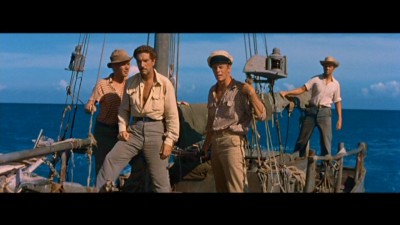
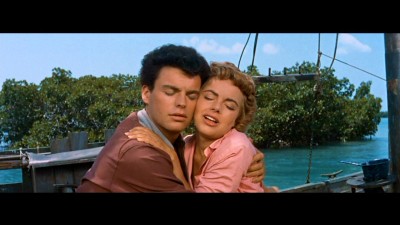
Sociology aside, Beneath the 12-Mile Reef is sloppy beyond belief, with far too many wilted dialogue scenes and far too little underwater action (which is usually reserved for slow, ponderous "travelogue" vistas used to show off the CinemaScope properties), as well as huge continuity problems that begger belief (the whole timeline between Roland's death and Wagner's return home with Moore is completely screwed up--how long has he been gone? A day? A month?). Director Robert D. Webb, with more credits as a second unit director than as a top-line helmer, can't find any rhythm in individual scenes, creating a dead, hollow feeling to the proceedings that's fatal. His handling of the actors seems to consist of nothing more than making sure they're placed dead center in the vast CinemaScope frame; eliciting rounded performances is obviously out of his grasp. Gilbert Roland, a skilled pro, is amusing here for all the wrong reasons, preening and posing it up something awful in lieu of any shadings to his stereotypical character (when he returns to land, and wags his eyebrows like Groucho before thickly laying this one on his wife-- "When we're alone, I'll, ah..say a big 'Hello,', uh mama? Hmmm?"--the effect is deliriously monstrous). Richard Boone has nothing to do here with his potentially intriguing character (he's understanding and sympathetic...and then he's a goon), while Peter Graves is comically inept as a vicious bully (his mock-fighting skills are hilariously stiff and gawky). I've never understood the appeal of Terry Moore, so when I see her grotesque attempts at pushme-pullyou flirting with Graves and Wagner, it's par for the course for this 50s starlet. As for Wagner, he wins the movie's worst thesping award hands-down (quite a feat). With his inky-black, permed hair making him look like a cross between the comic's Dondi and actress Ruth Roman, Wagner's unmistakable and totally inappropriate polish and good manners mark him as a most unusual working stiff, with his attempts at youthful Greek bravado outlandishly surreal (the punishment of a permanent photographic record of Wagner's delivery of "I'm a very beautiful young man!" almost makes up for anything that might have happened on The Splendour). Thank god composer Bernard Herrmann is around, penning yet another eerie, mesmerizing score that compares favorably to his other fantasy movie scores like Jason and the Argonauts and The Tree Worlds of Gulliver. Scenes that don't work from a dialogue or visual standpoint, such as Roland's description of the Reef, somehow come off better than they should, owing to the overwhelming power of Herrmann's music (it even helps the decidedly underwhelming, too short octopus attack--the dubious action "highlight" of Beneath the 12-Mile Reef). Having made that score possible, Beneath the 12-Mile Reef's production is to be commended...but only for that creation.
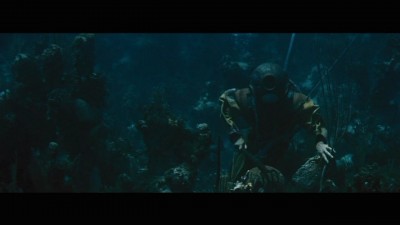
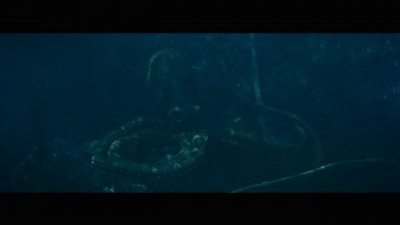
The DVD:
The Video:
Fox's Cinema Archives line can't help but confuse its customers. The back cover states this is "4:3 (letterbox)," when in reality the transfer for Beneath the 12-Mile Reef is a 2.40:1 anamorphically enhanced widescreen transfer that's quite bright and colorful, with minimal grain, some muddiness during dissolves, and a sharp image. Nice...so why turn off potential buyers with the wrong ratio info on the case?
The Audio:
The Dolby Digital English 2.0 stereo mix is exceptionally good for one of these Cinema Archive releases, with a clean, generally hiss-free sound, and a hefty re-recording level. No subtitles or closed-captions.
The Extras:
No extras for Beneath the 12-Mile Reef.
Final Thoughts:
Inept, sodden junk, enlivened only by Bernard Herrmann's dark, foreboding, fantastical score. Who cares if it was in CinemaScope? Pop it in and listen to the score. For that reason only, you can rent Beneath the 12-Mile Reef.
Paul Mavis is an internationally published movie and television historian, a member of the Online Film Critics Society, and the author of The Espionage Filmography.


|
| Popular Reviews |
| Sponsored Links |
|
|
| Sponsored Links |
|
|
| Release List | Reviews | Shop | Newsletter | Forum | DVD Giveaways | Blu-Ray | Advertise |
|
Copyright 2024 DVDTalk.com All Rights Reserved. Legal Info, Privacy Policy, Terms of Use,
Manage Preferences,
Your Privacy Choices | |||||||









